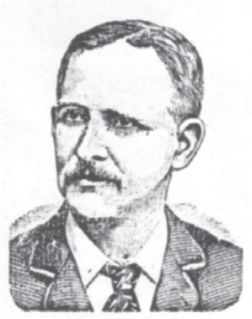Candidates
| | This section is empty. You can help by adding to it. (June 2016) |
The 1900 London University by-election was a parliamentary by-election held for the House of Commons constituency of London University on 6–10 February 1900. It was won by the Liberal Unionist party candidate Sir Michael Foster. [1]
The by-election was caused by the elevation to the peerage of the sitting Liberal Unionist Party MP Sir John Lubbock. Lubbock had held the seat since 1880, having previously been one of the MPs for the multi-member seat of Maidstone.
| | This section is empty. You can help by adding to it. (June 2016) |
| | This section is empty. You can help by adding to it. (June 2016) |
Sir Michael Foster won the election with a majority of 15 percent. [2]
| Party | Candidate | Votes | % | ±% | |
|---|---|---|---|---|---|
| Liberal Unionist | Sir Michael Foster | 1,271 | 46.73 | N/A | |
| Liberal | Dr. William Job Collins | 863 | 31.73 | N/A | |
| Ind. Liberal Unionist | Edward Henry Busk | 586 | 21.54 | N/A | |
| Majority | 408 | 15.00 | N/A | ||
| Turnout | 2,720 | 61.78 | N/A | ||
| Registered electors | 4,403 | ||||
| Liberal Unionist hold | Swing | N/A | |||
The election result was formally announced in the theatre of the university on 12 February 1900, following which Foster gave a short speech. He stated that the graduates of the university had for the first time returned a fellow graduate as their member, and told them he would be independent in his opinions even if he supported the present Unionist government. [3]

Sir Michael Foster was an English physiologist. He was instrumental in organizing the Cambridge Biological School and acted as Secretary of the Royal Society.
Wednesbury was a borough constituency in England's Black Country which returned one Member of Parliament (MP) to the House of Commons of the Parliament of the United Kingdom from 1868 until it was abolished for the February 1974 general election.
The 1929 Eddisbury by-election was a by-election held on 20 March 1929 for the British House of Commons constituency of Eddisbury.

Sir Joseph Walton, 1st Baronet, DL, JP was an English coalowner and Liberal Party politician.

Sir Alpheus Cleophas Morton was a British architect and surveyor, and a Liberal Party politician. He was active in local government in London from the 1880s until his death, and sat in the House of Commons in two periods between 1889 and 1918.
The 1919 St Albans by-election was a parliamentary by-election held in England in December 1919 for the House of Commons constituency of St Albans in Hertfordshire.

Walford Davis Green was a British barrister and Conservative Party politician. He sat in the House of Commons from 1895 to 1906.

Sir Clarendon Golding Hyde was a British businessman and Liberal Party politician. He sat in the House of Commons from 1906 to 1910, but his most significant public service was his participation in numerous government committees.
The 1903 Rochester by-election was a parliamentary by-election held in England in September 1903 for the House of Commons constituency of Rochester in Kent.

Sir Robert Purvis was a British barrister and Liberal Unionist politician. He sat in the House of Commons from 1895 to 1905 as the Member of Parliament (MP) for Peterborough.
The 1904 St Albans by-election was a parliamentary by-election held in England in February 1904 for the House of Commons. It elected a new Member of Parliament (MP) for the constituency of St Albans, a county division of Hertfordshire.
The Chorley by-election was a Parliamentary by-election. It returned one Member of Parliament (MP) to the House of Commons of the United Kingdom, elected by the first past the post voting system. Although it was a safe Unionist seat which was held, the reduction in the Unionist majority was notable.

The 1897 Walthamstow by-election was a parliamentary by-election held in England on 3 February 1897 for the House of Commons constituency of Walthamstow. The area was then a division of Essex, and is now part of Greater London.
The 1897 Liverpool Exchange by-election was a by-election held in England on 10 November 1897 for the House of Commons constituency of Liverpool Exchange.

The 1928 Ilford by-election was a parliamentary by-election for the British House of Commons constituency of Ilford, London on 23 February 1928.

Orkney and Shetland is a constituency of the House of Commons of the Parliament of the United Kingdom. It elects one Member of Parliament (MP) by the first past the post system of election. In the Scottish Parliament, Orkney and Shetland are separate constituencies.

The Mile End by-election was a Parliamentary by-election for the seat of Mile End, Tower Hamlets, in the east end of London. It returned one Member of Parliament (MP) to the House of Commons of the United Kingdom, elected by the first-past-the-post voting system.
The 1900 Plymouth by-election was held on 16 February 1900. The by-election came after the resignation of the incumbent Conservative MP, Sir Edward Clarke. It was won unopposed by the Conservative candidate Hon. Ivor Churchill Guest.
The 1900 Edinburgh and St Andrews Universities by-election was a parliamentary by-election held in Scotland in May 1900 for the House of Commons constituency of Edinburgh and St Andrews Universities.